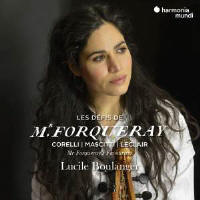Texte paru dans: / Appeared in: |
|
|
Appréciation d'ensemble / Overall evaluation :
|
|
|
Reviewer: Kate
Bolton-porciatti
This seductive recording by French viola dagambist Lucile Boulanger and her
talented trio of continuo players brings to light the virtuosic,
experimental and often melancholy sound world of the great French Baroque
viol player Antoine Forqueray. Boulanger traces the influence of the
lyrical, exuberant Italian violin style on the French vernacular, dishing up
a feast of arrangements and free transcriptions of violin sonatas by Corelli
(whose Op. 5 had taken France by storm), by Michele Mascitti (a Neapolitan
composer based in Paris), and by Forqueray’s col league Jean-Marie Leclair,
whose works fuse Italian verve with French grace. Boulanger’s aim is to
‘unshackle’ her instrument – a goal she certainly achieves in these
persuasive transcriptions, and in her delightfully unfettered playing she
emerges as something of a Jacqueline du Pré of the viol.
Forqueray’s own music drives the gamba to explore new effects and sonorities as
it scales the heights and plumbs the depths of the instrument. Boulanger
responds to his musical chiaroscuro, illuminating the autumnal colours of the
viol’s lower reaches with streams of melodious light. The continuo’s palette is
varied, too, from the thickly-layered textures created by a combination of
harpsichord, bass viol and theorbo to the bright and transparent sound of the
key board alone. The players are equally receptive to the expressive contrasts
of Forqueray’s bilingual idiom: here, fiery and virtuosic, inflamed by the
Italian ‘fantastic style’, elsewhere, languid and balletic, reflecting courtly
French tastes. My only quibble is that Harmonia Mundi’s open recording in a resonant chapel acoustic lacks a little warmth.
| |
|
|
|
|
|
|
|
Cliquez l'un ou l'autre
bouton pour découvrir bien d'autres critiques de CD |
|




